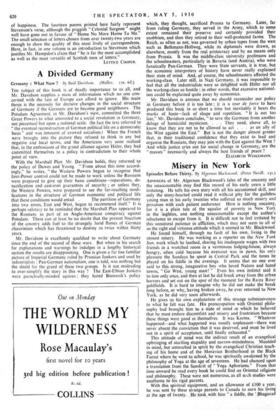A Divided Germany
Germany : What Now ? By Basil Davidson. (Muller. 125. 6d.)
THE subject of this book is of deadly importance to us all, and Mr. Davidson supplies a mass of information which no one con- cerned with the fate of Europe can afford to ignore. His main thesis is the necessity for decisive changes in the social structure of Germany if the Germans are to become good neighbours. The Potsdam Agreement, in Mr. Davidson's view, committed the three Great Powers to what amounted to a social revolution in Germany, not piecemeal but upon a national scale. (In fact the text referred to " the eventual reconstruction of German political life on a democratic basis " and was innocent of avowed socialism.) When the French were brought into the picture they refused to think in any but negative and local terms, and the Americans very soon realised that, in the enthusiasm of the grand alliance against Hitler, they had committed themselves to a policy in contradiction to their whole point of view.
With the Marshall Plan. Mr. Davidson holds, they returned to the policy of Dawes and Young. " From about this time accord- ingly," he writes, " the Western Powers began to recognise that four-Power control could not be made to work unless the Russians were prepared to give up their basic conditions—reparations, de- nazification and cast-iron guarantees of security ; or unless they, the Western Powers, were prepared to see the far-reaching modi- fications in the structure of German economic and political life
that these conditions would entail. . The partition of Germany into two zones, East and West, began to recommend itself." It is perhaps salutary to be reminded that the Marshall Plan appeared to the Russians as part of an Anglo-American conspiracy against Potsdam. There can at least be no doubt that the present bisection of the country adds fuel to the strangely lurid flames of German chauvinism which has threatened to destroy us twice within thirty years.
Mr. Davidson is excellently qualified to write about Germany since the end of the second of these wars. But when in his search for explanations and warnings he indulges in a lengthy historical section the results are disappointing. One is given a far too familiar picture of Imperial Germany ruled by Prussian Junkers and used by industrialists ; Pan-German nationalism, one is told, was nothing but the shield for the greed of these two groups. Is it not misleading to over-simplify the story in this way ? The East-Elbian Junkers were parochially-minded squires ; they hated Bismarck's policy
which, they thought, sacrificed Prussia to Germany. Later, far from ruling Germany, they served in the Army, which to some extent remained their preserve and certainly provided their snobbism, and then they retired to their well-protected farms. The Reich, as often as not, was governed by urban types from the west such as Bethmann-Hollweg, while its diplomats were drawn, as elsewhere, mostly from the real aristocracy and by no means only from Prussia. It was the middle-class university professors and the schoolmasters, particularly in Bavaria (and• Austria), who were fanatically Pan-German. They were State servants, it is true, but the economic interpreters of history have never really explained their state of mind. And, of course, the schoolmasters affected the working-class. Later still, in Nazi Germany, it was impossible to feel that all the industrialists were so delighted with Hitler nor all the working-class so hostile ; in other words, that excessive national- ism could be explained quite away by economics.
Mr. Davidson is anxious that we should reconsider our policy in Germany before it is too late ; it is a tour de force to have produced this book in so short a time but inevitably it bears the marks of haste—lack of shape and repetition. " It is not too late," Mr. Davidson concludes, " to save the Germans from another deluge of homicidal mysticism. . . . They need, above all, to know that they are not to be allowed to act . . . as an ally of the West against the East." But is not the danger almost greater that, in their traditional confidence that they exist to lead and organise the Russians, they may join with the East against the West ? And while justice cries out for social change in Germany)) are the " masses " necessarily and always the best friends of peace ?
ELIZABETH WISKEMANN.






































 Previous page
Previous page